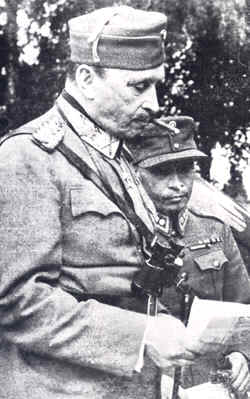Gustaf Mannerheim was born in Finland on 4th June 1867 into a wealthy family. Mannerheim was to command Finland’s military during the Winter War from 1939–1940 when Russia attacked after her occupation of eastern Poland at the start of World War Two. At the age of fourteen, Mannerheim was sent to the Military Cadet School in Hamina – though Finland’s future military commander was expelled for disciplinary reasons.
 |
In 1887, Mannerheim decided to enrol into the Russian army and he served in the Alexandrijski Dragoons, a regiment quartered in Poland. He was later transferred to St. Petersburg.
In 1892, he married Anastasia Arapova, the daughter of a Major-General, though the essentially marriage ended in 1903, though legally in 1919.
Mannerheim took part in the Russo-Japanese war of 1904-05 and was promoted to colonel in the battlefield. In 1906, Mannerheim was offered a special military commission to China. The journey to his posting took two years.
In 1911, Mannerheim was promoted to Major-General and he made his name during World War One. He was promoted to Lieutenant-General and was awarded the Cross of St George – the highest military award an officer in the Russian Army could receive.
The Russian Revolution of 1917 ended his career in the Russian Army and in December 1917 Mannerheim returned to a Finland that was both independent of Russian rule but also divided by revolutionary disturbances. The Finnish parliament gave Mannerheim the task of forming a Finnish Army that had the primary task of restoring Finland to stability. Mannerheim disarmed the 40,000 Russian troops still stationed in Finland and, after a three-month campaign, put down the rebels. By May 1918, Finland had been restored to relative calm.
| “The task of the army is accomplished. Our country is free. From the Tundras of Lapland, from the remotest skerries of Aaland to Systerback, the Lion flag is flying. The people of Finland have flung away the chains of centuries and stand ready to take the place that properly belongs to them.” Mannerheim |
However, Mannerheim fell out with Finland’s Senate. He was wary of their pro-German stance and resigned his post and went abroad in an attempt to influence countries that he believed were clearly going to win the war. Mannerheim believed that Britain and France needed to be allies of the newly created Finland if the nation was to survive. In December 1918, Mannerheim returned to Finland and stood in the country’s presidential elections – losing to K Ståhlberg. Mannerheim signed the constitution of Finland in July 1919.
Mannerheim encouraged Finland to take part in the anti-Bolshevik campaign during the Russian Civil War, but the failure of this led to him retiring from the military. In civilian life he worked for the Red Cross and established the Mannerheim League for Child Welfare. In 1933, he was awarded the title of Field Marshall in recognition of the work he had done in the military. He constructed a series of defence lines for Finland – known as the Mannerheim Line – across her south-east border. Though he was critical of Nazism, he participated in visits to Finland by Nazi leaders – including Goering’s hunting trips.
When Russia attacked Finland in November 1939, Mannerheim was appointed Commander-in-Chief of the Armed Forces of Finland. As well as fighting a military campaign against the Russians, Mannerheim was also concerned that Finland should not be seen as being pro-Germany and as a result of this he developed a political role as well as his military one.
In 1942, Mannerheim was appointed Marshall of Finland and in that year Hitler visited Finland to offer his congratulations. In a later visit to Germany , Mannerheim was received by Hitler.
In August 1944, Mannerheim was appointed President of Finland by the nation’s parliament in an attempt to get a separate peace settlement with the advancing Red Army of Russia. Finland withdrew from the war in September 1944.
In 1946, Mannerheim resigned his presidency due to poor health. He moved to Switzerland and spent his last few years in relative quiet.
Gustaf Mannerheim died in January 1951 at Lausanne in Switzerland aged 83. His body was returned to Finland where it was buried with full military honours in a hero’s cemetery.